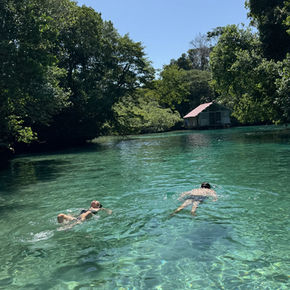
ABOUT
NAUTIC HORIZONS
OUR MISSION .
Nautic Horizons is a unique educational project that offers participants the opportunity to combine their academic studies with practical sailing experience . By traveling to different cities on three different continents , participants aged 14-17 ( lower and upper secondary school) experience different cultures up close and broaden their horizons. The program combines challenging academic courses with maritime training to promote both intellectual and personal development. Participants not only learn to navigate a ship but also develop skills such as teamwork, perseverance, and intercultural understanding. Nautic Horizons thus offers a transformative learning experience that goes far beyond the traditional classroom. Your classroom under sail awaits you!
Stay abroad
Nautic Horizons – A Study Abroad Program on a Sailing Ship
The Nautic Horizons project offers 14- to 17-year-old students from grades 10 and 11 the opportunity to live and learn for several months on board a traditional sailing vessel — without interrupting their academic progress.
Our goal: students return seamlessly to their home school and continue their education without any gaps.
Learning on Board – Structured & Personally Supported
Lessons take place six days per week and follow a fixed daily schedule.
Depending on your assigned watch, learning times may shift — ensuring the ship’s operations run smoothly while classes remain reliable.
Daily Learning Schedule on Board
10:00 – 13:00
→ Core subject lessons
→ taught by qualified teachers
14:00 – 17:00
→ Individual study time & small group work
→ supervised and supported by the teaching staff
The Logbook – Weekly Structure & Transparency
Every Sunday, teachers and students work together to create a weekly timetable, which is documented in the logbook. This ensures full clarity about upcoming tasks and how learning standards are maintained.
Digital Learning Platforms & Individual Support
We use platforms such as To Teach and School to go, which follow state-specific curricula within Germany.
Before the journey begins, our teachers compare the curriculum provided by the home school with our onboard program.
With the help of AI-supported learning platforms, individual materials are created that adapt to each student’s needs — always reviewed and guided by the teaching staff.
Learning progress, completed tasks, and feedback are digitally recorded and made transparent and accessible to students, parents, and home schools.
In addition, students bring the materials provided by their home school on board — especially for subjects outside the core curriculum.
Examinations & Academic Assessments
At the request of the home school, written tests, oral exams, or class assessments can be conducted on board.
All results are submitted digitally.
After completing the journey, each student receives:
-
a transcript of academic performance
-
a subject-specific evaluation
-
a portfolio of learning progress
-
a certificate and reference letter for their future educational path
Role of the Home School – Simple & Clear
To ensure seamless alignment with the curriculum, we only require the following from the home school:
-
the relevant curriculum plans for the leave of absence period
-
any exam requirements or materials (if applicable)
-
formal approval of the leave of absence
Nautic Horizons takes care of all further arrangements — lesson planning, progress monitoring, exam handling, and documentation.
→ This means: no additional workload for the home school.
Learning Through Daily Life on Board
Beyond classroom learning, students take responsibility in everyday life at sea:
-
in the rotating watch system for navigation, weather observation, and sail handling
-
in teams during projects and practical tasks
-
during shared activities on board and on land
Through this, they develop teamwork, responsibility, self-organization, and intercultural competence — essential skills that go far beyond a traditional classroom.
Who Is the Program For?
Nautic Horizons is ideal for motivated young people (14–17 years old) who:
-
are open to new ways of learning
-
want to take on responsibility
-
enjoy teamwork, adventure, and exploration
A leave of absence from the home school is required. We provide all necessary documents to ensure the stay on board is officially recognized as a study abroad experience.
Conclusion
Nautic Horizons combines academic learning with a unique life experience at sea.
Thanks to structured lessons, modern learning platforms, and close collaboration with home schools, educational progress is secured — and enriched by valuable personal, social, and linguistic skills.
A study abroad experience that expands education — without losing the academic thread.

.png)




